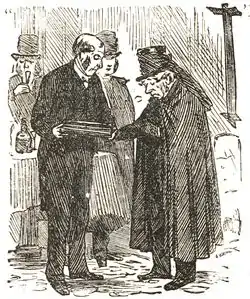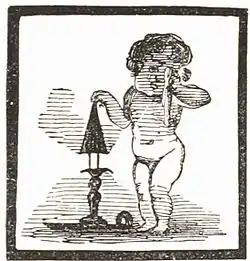LECTURE THE LAST.
MRS. CAUDLE HAS TAKEN COLD; THE TRAGEDY OF THIN SHOES.
 MR. CAUDLE A WIDOWER |
"No, Caudle; I wouldn't wish to say anything to accuse you: no, goodness knows, I wouldn't make you uncomfortable for the world,—but the cold I've got, I got ten years ago. I have never said anything about it—but it has never left me. Yes; ten years ago the day before yesterday.
"How can I recollect it?
"Oh, very well: women remember things you never think of: poor souls! they've good cause to do so. Ten years ago, I was sitting up for you,—there now, I'm not going to say anything to vex you, only do let me speak: ten years ago, I was waiting for you, and I fell asleep, and the fire went out, and when I woke I found I was sitting right in the draught of the keyhole. That was my death, Caudle, though don't let that make you uneasy, love; for I don't think you meant to do it.
"Ha! it's all very well for you to call it nonsense; and to lay your ill conduct upon my shoes. That's like a man, exactly! There never was a man yet that killed his wife, who couldn't give a good reason for it. No: I don't mean to say that you've killed me: quite the reverse: still there's never been a day that I haven't felt that key-hole. What?
"Why won't I have a doctor?
"What's the use of a doctor? Why should I put you to expense? Besides, I dare say you'll do very well without me, Caudle: yes, after a very little time you won't miss me much—no man ever does.
"Peggy tells me, Miss Prettyman called to-day.
"What of it?
"Nothing, of course. Yes; I know she heard I was ill, and that's why she came. A little indecent, I think, Mr. Caudle; she might wait; I shan't be in her way long; she may soon have the key of the caddy, now.
"Ha! Mr. Caudle, what's the use of your calling me your dearest soul now? Well, I do believe you. I dare say you do mean it; that is, I hope you do. Nevertheless, you can't expect I can lie quiet in this bed, and think of that young woman—not, indeed, that she's near so young as she gives herself out. I bear no malice towards her, Caudle,—not the least. Still, I don't think I could lie at peace in my grave if—well, I won't say anything more about her; but you know what I mean.
"I think dear mother would keep house beautifully for you when I'm gone. Well, love, I won't talk in that way if you desire it. Still, I know I've a dreadful cold; though I won't allow it for a minute to be the shoes—certainly not. I never would wear 'em thick, and you know it, and they never gave me a cold yet. No, dearest Caudle, it's ten years ago that did it; not that I'll say a syllable of the matter to hurt you. I'd die first.
"Mother, you see, knows all your little ways; and you wouldn't get another wife to study you and pet you up as I've done—a second wife never does; it isn't likely she should. And after all, we've been very happy. It hasn't been my fault if we've ever had a word or two, for you couldn't help now and then being aggravating; nobody can help their tempers always,—especially men. Still we've been very happy, haven't we, Caudle?
"Good-night. Yes,—this cold does tear me to pieces; but for all that, it isn't the shoes. God bless you, Caudle; no,—it's not the shoes. I won't say it's the key-hole; but again I say, it's not the shoes. God bless you once more—But never say it's the shoes."

The above significant sketch is a correct copy of a drawing from the hand of Caudle at the end of this Lecture. It can hardly, we think, be imagined that Mrs. Caudle, during her fatal illness, never mixed admonishment with soothing as before; but such fragmentary Lectures were, doubtless, considered by her disconsolate widower as having too touching, too solemn an import to be vulgarised by type. They were, however, printed on the heart of Caudle; for he never ceased to speak of the late partner of his bed as either "his sainted creature," or "that angel now in heaven."